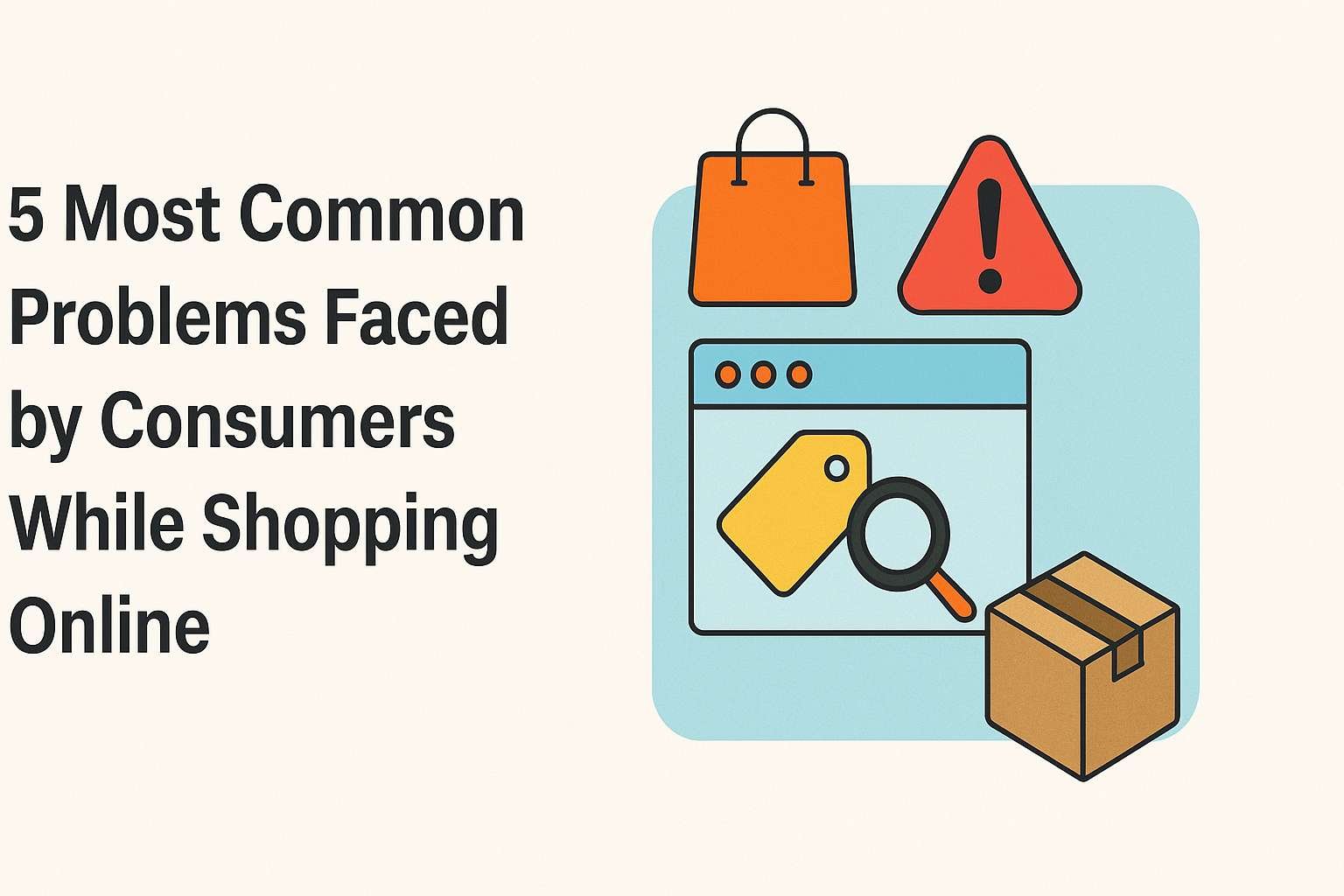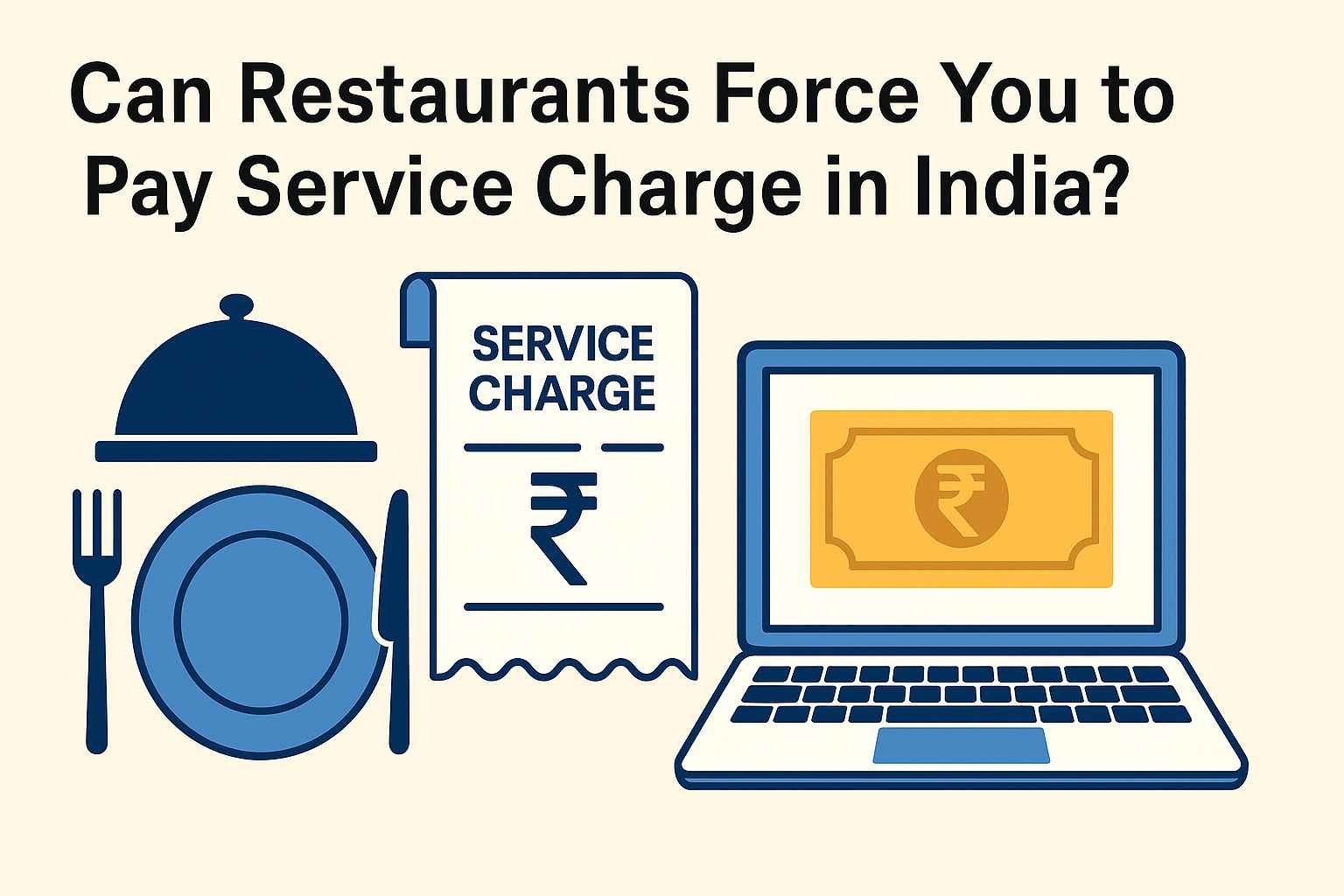On this page you will read detailed information about 5 Most Common Problems faced by Consumers While Shopping Online
Online shopping has revolutionized the way Indians buy and sell goods. With over 220 million digital buyers in India (as of 2025), platforms like Amazon, Flipkart, Meesho, Myntra, and countless D2C websites have made e-commerce part of everyday life.
However, convenience comes with its own challenges. Despite the rapid expansion of digital commerce, consumer grievances related to online shopping remain among the top complaints filed with India’s National Consumer Helpline (NCH) and under the Consumer Protection Act, 2019.
This blog explores the five most common problems faced by consumers while shopping online, their legal remedies under Indian law, and practical ways to safeguard yourself.
1. Receiving Wrong or Defective Products
One of the most frequent online shopping complaints is receiving damaged, defective, fake, or wrong products.
How it happens:
- Product images and descriptions online may differ from what’s delivered.
- Sellers sometimes ship counterfeit or substandard versions of branded items.
- Mishandling during transit can lead to damaged goods.
Real-world example:
In 2024, multiple cases were reported where consumers received refurbished or used electronics sold as new, especially via third-party marketplace sellers.
Your legal rights:
Under the Consumer Protection (E-Commerce) Rules, 2020, sellers must ensure that products are authentic and correspond to their descriptions. Rule 4(2) prohibits misleading product representations.
You can:
- File a complaint on the seller’s platform via their inbuilt grievance redressal mechanism (mandatory by law).
- Contact the National Consumer Helpline (1800-11-4000).
- File an online complaint at consumerhelpline.gov.in.
If unresolved, you can escalate to a District Consumer Commission under the Consumer Protection Act, 2019 for compensation or replacement.
Prevention tip:
Always check verified reviews, seller ratings, and product authenticity seals (like Amazon’s “Fulfilled” or Flipkart’s “Assured”).
2. Delayed Deliveries and Non-Delivery of Orders
Despite improvements in logistics, late deliveries and missing parcels continue to frustrate buyers—especially during festive sales or high-demand periods.
How it happens:
- Supply chain bottlenecks, warehouse errors, or courier delays.
- Sellers marking fake “dispatched” or “delivered” statuses.
- Address mismatch or poor coordination with local delivery partners.
Legal backing:
Rule 5(3)(b) of the E-Commerce Rules, 2020 obliges platforms to provide accurate information on expected delivery timelines and ensure fair refund policies for delays.
Under the Consumer Protection Act, 2019, delays without valid justification may amount to deficiency of service.
What you can do:
- Contact customer care and keep chat/email records.
- If the item shows “delivered” but isn’t received, raise a missing parcel claim immediately.
- File a grievance with the e-commerce platform or, if unresolved, submit a complaint to the CCPA (Central Consumer Protection Authority).
Prevention tip:
Choose sellers offering guaranteed delivery dates, and always record communication for future reference.
3. Refund and Return Issues
Many consumers complain about refund delays, rejected return requests, or store-credit refunds that restrict the buyer’s freedom to use money elsewhere.
Common issues:
- Companies rejecting returns citing “policy exceptions.”
- Refusing refunds for wrong or defective items.
- Delay in refund beyond the promised 7–10 business days.
Legal provisions:
Under Rule 6(5) of the E-Commerce Rules, 2020, platforms must process refunds within a reasonable time once the consumer is eligible.
Moreover, Section 2(47) of the Consumer Protection Act, 2019 defines unfair trade practices, including denying refunds or returns after misleading promises.
What you can do:
- First, escalate to the company’s grievance officer (whose details must be published on the website).
- If not resolved, contact consumerhelpline.gov.in or approach the Consumer Commission.
- You can claim refund + compensation for mental agony caused by the delay.
Prevention tip:
Before ordering, always read the seller’s return/refund policy, especially for electronics, groceries, or perishable goods where exceptions often apply.
In the previous post, we had shared information about Can Restaurants Force You to Pay Service Charge in India?, so read that post also.
4. Data Privacy and Payment Fraud
With the increase in digital payments and UPI-based transactions, cyber fraud has become a major threat. Consumers sometimes face:
- Fake payment links shared via messages.
- Phishing websites posing as legitimate e-commerce portals.
- Unauthorised use of stored debit/credit card details.
Legal protection:
- Information Technology Act, 2000 (amended 2021) provides for punishment of identity theft and hacking under Sections 43A, 66C, and 66D.
- Under Consumer Protection (E-Commerce) Rules, 2020, platforms must ensure secure payment systems and protect personal data.
- RBI guidelines (2023) mandate tokenisation and two-factor authentication for all online card transactions.
Remedies:
If you face unauthorised payment:
- Report immediately to your bank and cybercrime portal (cybercrime.gov.in).
- Contact CCPA or Consumer Helpline for parallel action if a fake seller is involved.
- Keep screenshots and bank transaction details as evidence.
Prevention tip:
Use only trusted platforms, never share OTPs, and avoid clicking on unsolicited refund or delivery links.
5. Misleading Advertisements and Fake Discounts
This is one of the fastest-growing complaints under India’s 2025 e-commerce landscape. Consumers are frequently lured by “flash sales” that turn out to be deceptive.
Examples include:
- Inflated “MRP” shown to create a fake discount illusion.
- “Limited stock” or “90% off” claims that are false.
- Fake influencer marketing promoting unverified sellers.
Legal safeguards:
The Central Consumer Protection Authority (CCPA) actively penalizes such conduct under:
- Section 2(28) of the Consumer Protection Act, 2019 – defines misleading advertisement.
- Guidelines for Prevention of Misleading Advertisements, 2022 – mandates proof of claims, brand accountability, and influencer disclosure (#Ad or #Sponsored).
In 2024, the CCPA fined several online platforms for false “mega discount” campaigns during festive sales.
What you can do:
- Take screenshots of misleading ads before purchase.
- Report to the CCPA via its complaint portal.
- If the product fails to match its advertised description, you are entitled to replacement/refund + compensation.
Prevention tip:
Rely only on verified sellers and be skeptical of “too good to be true” deals.
Legal Avenues for Redressal
Indian consumers have multiple avenues for filing complaints:
- E-commerce platform grievance officer (first level)
- National Consumer Helpline (second level)
- Central Consumer Protection Authority (CCPA) – for serious violations
- District/State/National Consumer Commissions – for compensation claims under the Consumer Protection Act, 2019.
You can file complaints online through:
👉 https://consumerhelpline.gov.in
👉 https://edaakhil.nic.in (for e-filing cases before Consumer Commissions)
Conclusion
Online shopping has made life easier, but consumer vigilance remains essential. The most common problems—wrong products, delayed deliveries, refund delays, data fraud, and misleading ads—can all be prevented or resolved when you know your rights.
Disclaimer
The information and services on this website are not intended to and shall not be used as legal advice. You should consult a Legal Professional for any legal or solicited advice. While we have good faith and our own independent research to every information listed on the website and do our best to ensure that the data provided is accurate. However, we do not guarantee the information provided is accurate and make no representation or warranty of any kind, express or implied, regarding the accuracy, adequacy, validity, reliability, availability, or completeness of any information on the Site. UNDER NO CIRCUMSTANCES SHALL WE HAVE ANY LIABILITY TO YOU FOR ANY LOSS OR DAMAGE OF ANY KIND INCURRED AS A RESULT OR RELIANCE ON ANY INFORMATION PROVIDED ON THE SITE. YOUR USE OF THE SITE AND YOUR RELIANCE ON ANY INFORMATION ON THE SITE IS SOLELY AT YOUR OWN RISK. Comments on this website are the sole responsibility of their writers so the accuracy, completeness, veracity, honesty, factuality and politeness of comments are not guaranteed.
So friends, today we talked about 5 Most Common Problems faced by Consumers While Shopping Online, hope you liked our post.
If you liked the information about 5 Most Common Problems faced by Consumers While Shopping Online, then definitely share this article with your friends.
Knowing about laws can make you feel super smart ! If you find value in the content you may consider joining our not for profit Legal Community ! You can ask unlimited questions on WhatsApp and get answers. You can DM or send your name & number to 8208309918 on WhatsApp







